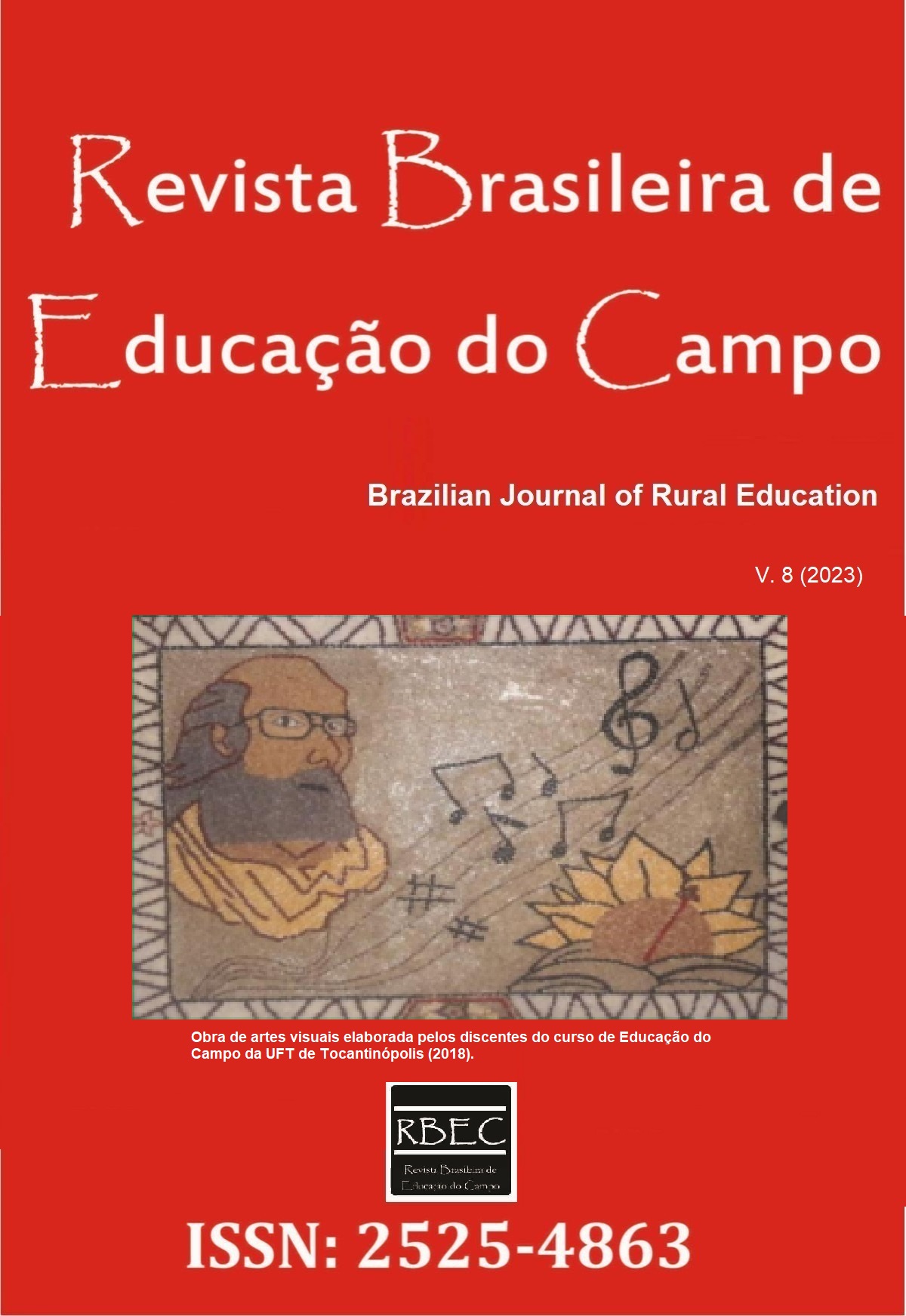The correlation between caring and educating from the point of view of nursery school monitors and teachers
DOI:
https://doi.org/10.20873/uft.rbec.e15573Abstract
ABSTRACT. The writing deals with the correlation between caring and educating from the point of view of daycare monitors and teachers. The discussion is based on curricular documents about and for Early Childhood Education, in dialogue with authors who discuss the theme. Our main objective is to analyze the correlation between caring and educating based on the relationship between teachers and monitors of municipal daycare centers in Tocantinópolis (TO). The methodology used was the bibliographic analysis followed by the application of a questionnaire to teachers and monitors, with objective and discursive questions referring to the work they develop and the relationships that involve this work. From the analysis carried out, we consider the need for continuous training proposals for early childhood education professionals to be evident, since a constant attempt to divide between the practices of educating and caring is still perceptible, according to the understanding of some teachers present in these educational institutions.
Downloads
References
Angotti, M. (Org). (2008). Educação infantil: para que, para quem e por quê? Campinas, SP: Alínea.
Brasil. (2018). Base Nacional Comum Curricular. Brasília, DF: MEC.
Brasil. (2016). LDB – Lei de Diretrizes e Bases da Educação Nacional: Lei n. 9.394, de 20 de dezembro de 1996, que estabelece as diretrizes e bases da educação nacional (12ª ed.). Brasília, DF: Câmara dos Deputados, Edições Câmara.
Brasil. (1988). Constituição da República Federativa do Brasil. (1988, 05 de outubro). Recuperado de: https://www.planalto.gov.br/ccivil_03/constituicao/constituicao.htm
Brasil. (2010). Ministério da Educação. Secretaria de Educação Básica. Diretrizes curriculares nacionais para a educação infantil. Brasília, DF: MEC.
Brasil. Lei nº 9.394, de 20 de dezembro de 1996. (1996, 23 dezembro). Estabelece as diretrizes e bases da educação nacional. Diário Oficial da União. Recuperado de: www.planalto.gov.br/ccivil_03/Leis/L9394.htm
Brasil. (1998). Referencial curricular nacional para a educação infantil. Brasília, DF: MEC/SEF.
Cerisara, A. B. (1999). Educar e cuidar: por onde anda a educação infantil? Perspectiva,17(1, Edição Especial), 11-21.
Freire, P. (1996). Pedagogia da autonomia: saberes necessários à prática educativa. São Paulo: Paz e Terra.
Guimarães, N. A., Hirata, H. S., & Sugita, K. (2011). Cuidado e cuidadoras: o trabalho de care no Brasil, França e Japão. Sociologia & Antropologia, 01(01), 151-180. https://doi.org/10.1590/2238-38752011v117
Kramer, S. (2006). Com a pré-escola nas mãos: uma alternativa curricular para a educação infantil (14ª ed.). São Paulo, SP: Ática.
Dumont-Pena, É. (2015). Cuidar: relações sociais, técnicas e sentidos no contexto da educação infantil (Tese de Doutorado). Universidade Federal de Minas Gerais, Belo Horizonte. Repositório do Campus UFMG. https://repositorio.ufmg.br/bitstream/1843/BUBD-A4CF73/1/erica.tese.final.pdf
Locatelli, A. S. (2018). A emergência da educação infantil e o trabalho docente: um estudo da rede pública de ensino no norte do Tocantins (Tese de Doutorado). Universidade Federal de Minas Gerais, Belo Horizonte. Repositório do Campus UFMG. https://repositorio.ufmg.br/bitstream/1843/BUOS-BA8NP7/1/locatelli_arinalda_versao_final.pdf
Locatelli, A. S. (2022). A política de formação continuada no contexto dos planos municipais de educação: o lugar das professoras auxiliares. In Locatelli, A. S., & Locatelli, C. (Orgs.). A formação docente nos planos subnacionais de educação: especificidades do planejamento no Tocantins e nos municípios do norte do estado (pp. 85-106). Curitiba, PR: CRV. https://doi.org/10.24824/978652512701.9
Locatelli, A. S., & Vieira, L. M. F. (2020). O trabalho das professoras de educação infantil: o cuidado como uma categoria social. In Riscarolli, E. (Org.). Docência e práticas: percursos, reflexões e experiências no cotidiano da educação (pp. 121-140). Curitiba, PR: CRV.
Maranhão, D. G., & Sarti, C. A. (2008). Creche e família: uma parceria necessária. Cadernos de Pesquisa, 38(133), 171-194. https://doi.org/10.1590/S0100-15742008000100008.
Oliveira, T. G. (2017). Docência e educação infantil: condições de trabalho e profissão docente (Dissertação de Mestrado). Universidade Federal de Minas Gerais, Belo Horizonte. Repositório do Campus UFMG. https://gestrado.net.br/wp-content/uploads/2020/09/dissertacao_tiago_grama.pdf.
Paschoal, J. D., & Machado, M. C. G. (2009). A História da Educação Infantil no Brasil: avanços, retrocessos e desafios dessa modalidade educacional. Revista HISTEDBR On-line, 9(33), 78-95. https://doi.org/10.20396/rho.v9i33.8639555
Pietrobon, S. R. G., & Ujiie, N. T. (2007). A Prática educativa na educação infantil: organização do tempo/espaço. REP - Revista Espaço Pedagógico, 14(1), 231-240. https://doi.org/10.5335/rep.v14i1.7695
Edital do Concurso Público de Tocantinópolis TO n° 001/2016. (2016, 14 de outubro). Prefeitura Municipal da cidade de Tocantinópolis, TO. Recuperado de: https://concursos.icap-to.com.br/informacoes/44/
Published
How to Cite
Issue
Section
License
Copyright (c) 2023 Mércia Cristina Borges dos Anjos, Arinalda Silva Locatelli

This work is licensed under a Creative Commons Attribution 4.0 International License.
Proposal for Copyright Notice Creative Commons
1. Policy Proposal to Open Access Journals
Authors who publish with this journal agree to the following terms:
A. Authors retain copyright and grant the journal right of first publication with the work simultaneously licensed under the Creative Commons Attribution License that allows sharing the work with recognition of its initial publication in this journal.
B. Authors are able to take on additional contracts separately, non-exclusive distribution of the version of the paper published in this journal (ex .: publish in institutional repository or as a book), with an acknowledgment of its initial publication in this journal.
C. Authors are permitted and encouraged to post their work online (eg .: in institutional repositories or on their website) at any point before or during the editorial process, as it can lead to productive exchanges, as well as increase the impact and the citation of published work (See the Effect of Open Access).















